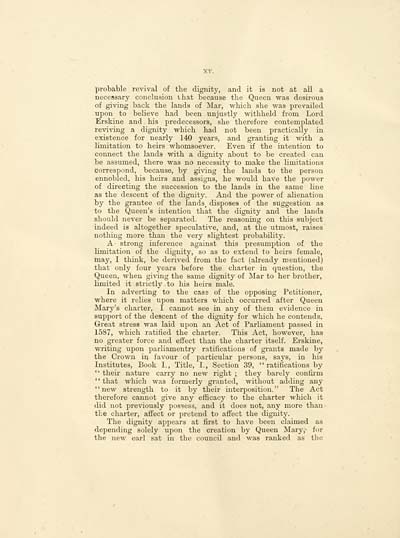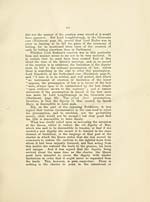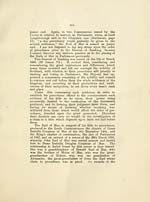Paper on the Mar peerage
(44) Page xv
Download files
Complete book:
Individual page:
Thumbnail gallery: Grid view | List view

probable revival of the dignity, and it is not at all a
necessary conclusion that because the Queen was desirous
of giving back the lands of Mar, which she was prevailed
upon to believe had been unjustly withheld from Lord
Erskine and his predecessors, she therefore contemplated
reviving a dignity which had not been practically in
existence for nearly 140 years, and granting it with a
limitation to heirs whomsoever. Even if the intention to
connect the lands with a dignity about to be created can
be assumed, there was no necessity to make the limitations
correspond, because, by giving the lands to the person
ennobled, his heirs and assigns, he would have the power
of directing the succession to the lands in the same line
as the descent of the dignity. And the power of alienation
by the grantee of the lauds, disposes of the suggestion as
to the Queen's intention that the dignity and the lands
should never be separated. The reasoning on this subject
indeed is altogether speculative, and, at the utmost, raises
nothing more than the very slightest probability.
A- strong inference against this presumption of the
limitation of the dignity, so as to extend to heirs female,
may, I think, be derived from the fact (already mentioned)
that only four years before the charter in question, the
Queen, when giving the same dignity of Mar to her brother,
limited it strictly. to his heirs male.
In adverting to the case of the opposing Petitioner,
where it relies upon matters which occurred after Queen
Mary's charter, I cannot see in any of them evidence in
support of the descent of the dignity for which he contends.
Great stress was laid upon an Act of Parliament passed in
1587, which ratified the charter. This Act, however, has
no greater force and effect than the charter itself. Erskine,
writing upon parliamentry ratifications of grants made by
the Crown in favour of particular persons, says, in his
Institutes, Book I., Title, I., Section 39, "ratifications by
" their nature carry no new right ; they barely confirm
' ' that which was formerly granted, without adding any
"new strength to it by their interposition." The Act
therefore cannot give any efficacy to the charter which it
did not previously possess, and it does not, any more than
the charter, affect or pretend to affect the dignity.
The dignity appears at first to have been claimed as
depending solely upon the creation by Queen Mary, for
the new earl sat in the council ami was ranked as the
necessary conclusion that because the Queen was desirous
of giving back the lands of Mar, which she was prevailed
upon to believe had been unjustly withheld from Lord
Erskine and his predecessors, she therefore contemplated
reviving a dignity which had not been practically in
existence for nearly 140 years, and granting it with a
limitation to heirs whomsoever. Even if the intention to
connect the lands with a dignity about to be created can
be assumed, there was no necessity to make the limitations
correspond, because, by giving the lands to the person
ennobled, his heirs and assigns, he would have the power
of directing the succession to the lands in the same line
as the descent of the dignity. And the power of alienation
by the grantee of the lauds, disposes of the suggestion as
to the Queen's intention that the dignity and the lands
should never be separated. The reasoning on this subject
indeed is altogether speculative, and, at the utmost, raises
nothing more than the very slightest probability.
A- strong inference against this presumption of the
limitation of the dignity, so as to extend to heirs female,
may, I think, be derived from the fact (already mentioned)
that only four years before the charter in question, the
Queen, when giving the same dignity of Mar to her brother,
limited it strictly. to his heirs male.
In adverting to the case of the opposing Petitioner,
where it relies upon matters which occurred after Queen
Mary's charter, I cannot see in any of them evidence in
support of the descent of the dignity for which he contends.
Great stress was laid upon an Act of Parliament passed in
1587, which ratified the charter. This Act, however, has
no greater force and effect than the charter itself. Erskine,
writing upon parliamentry ratifications of grants made by
the Crown in favour of particular persons, says, in his
Institutes, Book I., Title, I., Section 39, "ratifications by
" their nature carry no new right ; they barely confirm
' ' that which was formerly granted, without adding any
"new strength to it by their interposition." The Act
therefore cannot give any efficacy to the charter which it
did not previously possess, and it does not, any more than
the charter, affect or pretend to affect the dignity.
The dignity appears at first to have been claimed as
depending solely upon the creation by Queen Mary, for
the new earl sat in the council ami was ranked as the
Set display mode to:
![]() Universal Viewer |
Universal Viewer | ![]() Mirador |
Large image | Transcription
Mirador |
Large image | Transcription
Images and transcriptions on this page, including medium image downloads, may be used under the Creative Commons Attribution 4.0 International Licence unless otherwise stated. ![]()
| Histories of Scottish families > Paper on the Mar peerage > (44) Page xv |
|---|
| Permanent URL | https://digital.nls.uk/94944338 |
|---|
| Description | A selection of almost 400 printed items relating to the history of Scottish families, mostly dating from the 19th and early 20th centuries. Includes memoirs, genealogies and clan histories, with a few produced by emigrant families. The earliest family history goes back to AD 916. |
|---|

